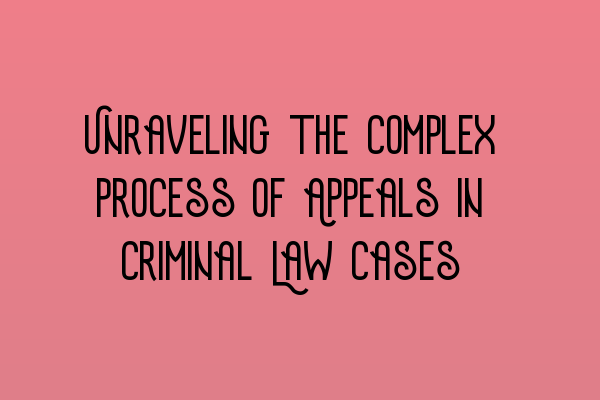Unraveling the Complex Process of Appeals in Criminal Law Cases
When it comes to criminal law, the appeals process can be both complex and overwhelming. Each case is unique, presenting its own set of circumstances and challenges. Understanding the intricacies of the appeals process is crucial for both defendants and attorneys alike.
What is an Appeal?
An appeal is a legal process that allows a party to challenge a court’s decision. In criminal law cases, it gives an individual the opportunity to have their conviction or sentence reconsidered by a higher court. Appeals are not retrials. They focus on errors made during the original trial that may have affected the outcome.
However, appeals must meet specific criteria in order to be considered. Grounds for appeal can include errors in the application of the law, misconduct by the prosecution, or the discovery of new evidence that was not available during the original trial.
The Appeals Process
The appeals process typically begins with filing a notice of appeal within a specified timeframe. In the UK, the time limit for filing an appeal is usually 28 days from the date of the conviction or sentence.
Once the notice of appeal is filed, the appellant and their legal team must prepare a written argument outlining the grounds for the appeal. This document is known as the “appellant’s case.” It provides a detailed explanation of the errors made during the trial and how they affected the outcome.
After the appellant’s case is filed, the prosecution has the opportunity to respond with a written document called the “respondent’s case.” This document addresses the arguments made by the appellant and seeks to defend the original court’s decision.
Once both the appellant’s and respondent’s cases have been submitted, the appeal will proceed to an oral hearing. At the hearing, both parties will have the opportunity to present their arguments before the appellate court judges. They may also be questioned by the judges in order to gain a better understanding of the case.
After hearing all the evidence and arguments, the appellate court will make a decision. This decision can range from upholding the original court’s decision, modifying the sentence, or ordering a retrial.
Why Seek Legal Assistance?
The appeals process can be complex and require a deep understanding of criminal law and court procedures. Seeking legal assistance is crucial to ensuring the best possible chances of success in an appeal case.
Professional solicitors specializing in criminal law, like SQE Criminal Law & Practice Law UK, have extensive knowledge and experience in navigating the appeals process. They can analyze the trial records, identify errors, research legal precedents, and craft compelling arguments that will maximize the chances of a successful appeal.
Furthermore, skilled solicitors understand the importance of staying up to date with changes in legislation and legal practices. This knowledge enables them to provide the most effective representation and advice to their clients.
Whether you are considering filing an appeal or have been served with a notice of appeal, seeking the guidance of a qualified solicitor is essential. They will guide you through the complex appeals process, explain your legal rights, and work tirelessly to secure the best outcome for your case.
The Importance of Preparation
Preparing for an appeal is a meticulous process that requires careful attention to detail. It is essential to gather all relevant documents, review transcripts, and consult with legal experts who specialize in criminal appeals.
SQE Criminal Law & Practice Law UK offers SQE 1 preparation courses to help aspiring criminal law solicitors develop their skills in handling appeals and other criminal law matters. These courses provide comprehensive training in all aspects of criminal law, ensuring that solicitors are well-equipped to navigate the appeals process confidently.
Additionally, SQE 2 preparation courses are available to those who have successfully completed SQE 1 and are preparing for the second stage of the qualification. These courses provide advanced training and guidance for solicitors who want to enhance their expertise in criminal law and better serve their clients during the appeals process.
Stay Informed with SQE Criminal Law & Practice Law UK
For more information about SQE 1 and SQE 2 preparation courses, as well as the latest updates on SRA SQE exam dates, visit SQE Criminal Law & Practice Law UK. Stay informed and stay ahead in the world of criminal law.
If you’re looking for additional resources to enhance your SQE 1 exam preparation, consider exploring SQE 1 practice exam questions and practice mocks FLK1 FLK2, which can serve as valuable study aids.
Remember, when it comes to appeals in criminal law cases, knowledge and preparation are key. Trust the experts at SQE Criminal Law & Practice Law UK to guide you through this complex legal process with professionalism and expertise.
